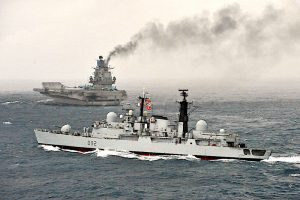Russia’s intervention in Libya is designed to surround Europe in a “grand game” of geostrategy, Italy’s former military chief has said like reported by euobserver.com .
Luigi Binelli Mantelli, who led Italy’s armed forces from 2013 to 2015, told EUobserver that Russia’s attempt to gain a foothold in Libya was about bigger issues than oil, migrants, or terrorists.
He said Russian leader Vladimir Putin’s main objective was for Russia to “play a growing role as a global power, somehow overcoming even the US as a leader of the post-Cold War international order”.
He added that Russia was doing this by “strengthening its strategic presence” in the Arctic, the Baltic, the Black Sea, and in the Mediterranean region in what he called an “arc of iron”.
The retired admiral said his views were his own and did not represent the official position of Italy, a former colonial power in Libya, which is leading EU efforts to establish order in the fragmented country.
The new “arc of iron” has seen Russia reopen Soviet-era bases in the High North and redouble military forces in its Kaliningrad exclave in the Baltic.
Three years ago, it seized Crimea from Ukraine and has built up its military presence in the Black Sea peninsula.
It has reinforced its naval base in Syria and has agreed with China to share a new naval facility in Djibouti.
It is also cultivating close ties with Egypt and with a Libyan warlord, Khalifa Haftar.
“If you look at the naval bases, in particular the joint base with China, Europe is in a way surrounded on its eastern side and its southern side”, Binelli Mantelli said.
He noted the Ukraine conflict had reached a “stalemate”, but that the West was now in “open competition” with Russia for influence in the Mediterranean region.
In Libya, Russia has given money, equipment, training, and diplomatic support to Haftar, a former army chief who controls the east of the country.
Libya and Haftar
Binelli Mantelli said Haftar was the only man who looked capable of re-establishing order.
EU and Nato states have backed the UN-recognised Government of National Unity (GNA) in Tripoli, but the Italian admiral said the GNA was “weak”.
“The only party in Libya … that has the chance to regain unity or at least power over the country is Haftar. The government in Tripoli is very weak and divided and could collapse at any time”, argued Binelli Mantelli.
He said it was “reasonable” to think Putin would ask Haftar’s permission to build a Russian naval base in Libya in return for his support.
He added that Russian deployments should not be seen “in terms of military operations” against the EU, but “in terms of a grand strategy, a great game” to enhance its global status.
Binelli Mantelli said it was Nato’s, not the EU’s, role to vie for influence with Russia.
EU states have outlined plans for deeper military cooperation, but these are at an early stage.
They stand divided on core issues, such as further integration and on how to handle the migrant crisis. They are also trying to cope with Brexit and with an inward turn by the US under Donald Trump.
“The EU is, in my view, today, not a strategic power,” Binelli Mantelli said.
Realpolitik
The West made a mistake, argued Binelli Mantelli, by “moving too fast” in trying to align countries such as Georgia, which Russia also invaded in 2008, and Ukraine with the West.
He added that a “more cautious approach” in the “sensitive” former Soviet sphere might have given “more positive results” in terms of expanding Western influence there.
The West ought to “adopt a sharp and realistic strategy with Russia … which means cooperation more than open opposition to Putin’s moves,” he said, on issues such as migrants, terrorism, and Libyan reconstruction.
He said it should “compete” with Russia at the same time by forging closer ties with China, Egypt, Iran, and Libya.
Binelli Mantelli said he was speaking in terms of “realpolitik”, putting aside his own views on democratic or humanitarian values.
“I’m not in favour of Putin, I’m just being realistic”, he remarked.
“Haftar is the best realpolitik choice in Libya, not the best in terms of democracy or humanitarian rights,” he added.
“In Libya, you need someone strong, like Gaddafi, who was capable of keeping these people [Libya’s armed tribes] under the thumb. It’s not politically correct, but you should be realistic,” he said, referring to Libya’s late dictator, Muammar Gaddafi.



